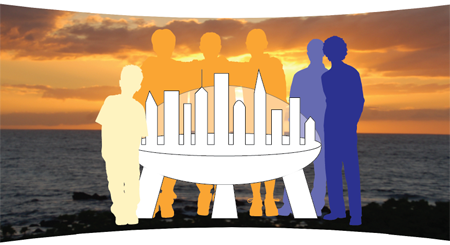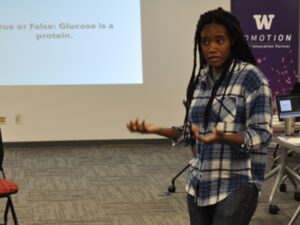Virtual Maker Lab

The Virtual Maker Lab is a location-based VR learning experience hosted in our RealityNext Studio. What makes our learning environments unique is the freedom for students to work among themselves to create their own learning and teaching arrangements. To stimulate habitual self-learning, we are working on education technologies designed to manage live interactions between the instructor and student with gradually increasing autonomy in 360º virtual reality.
 Today, we are working on a series of user-generated VR story-games made by teenagers. We engage kids in a series of analog exercises to simulate world building and story making as if kids were inside the game in a motion-capture studio. We use mixed-media tools and multi-modal exercises that result in short, self-made, immersive experiences that can be released in VR arcades or played at home on PCs and consoles.
Today, we are working on a series of user-generated VR story-games made by teenagers. We engage kids in a series of analog exercises to simulate world building and story making as if kids were inside the game in a motion-capture studio. We use mixed-media tools and multi-modal exercises that result in short, self-made, immersive experiences that can be released in VR arcades or played at home on PCs and consoles.
Download the report on our first workshop.
In the full version, most future functions and assessment tools will become interactive libraries and non-player characters that help the students inhabit a Virtual Learning simulation with their own narratives. To succeed and move to the next level, students will need to complete 10 multidisciplinary “missions,” classified by subject.
Inside the Virtual Maker Lab, students will:
- Watch a refresher on single or interdisciplinary subject/s, then collaborate with other students to solve a series of challenges
- Storyboard a narrative on the subject matter
- Improvise, rehearse and record a self-designed story-game in motion capture
The deliverable, a showcase of each mission, becomes the student’s virtual library, published by area of interest.
While students learn and play in their VR spaces, experts analyze and monitor quality of comprehension and the responsiveness of students to multi-modal education technologies.
The experience includes:
- Instruction, guidance and support from teachers/facilitators from start to finish
- An introduction to project development and group dynamic
- Engaging immersive research resources
- Narrative-building tools
- Recording and replaying through the motion capture interface
- Role playing and character exploration
- On-stage avatar costume changes
- Manipulation of virtual objects
- Recognition through the Open Badge system
Together we practice critical thinking, visualization, communication, self-assessment, choice, consensus building, problem solving, goal setting, and reflection.
 “The ideal of interactive, highly engaging training and education is ancient. A Chinese proverb says: ‘Tell me, and I’ll forget. Show me, and I may remember. Involve me, and I’ll understand.’ However, the gap continues to grow between antiquated, passive training methods and a workforce that lives an ever more interactive, multimedia, user-controlled lifestyle. With game-based learning tools to bridge that gap comes the promise of vastly more productive and engaged students and workers—ones who embrace learning rather than view it as a disruptive burden.”
“The ideal of interactive, highly engaging training and education is ancient. A Chinese proverb says: ‘Tell me, and I’ll forget. Show me, and I may remember. Involve me, and I’ll understand.’ However, the gap continues to grow between antiquated, passive training methods and a workforce that lives an ever more interactive, multimedia, user-controlled lifestyle. With game-based learning tools to bridge that gap comes the promise of vastly more productive and engaged students and workers—ones who embrace learning rather than view it as a disruptive burden.”
— Jessica Trybus, Director of Edutainment,
Carnegie Mellon University’s Entertainment Technology Center
